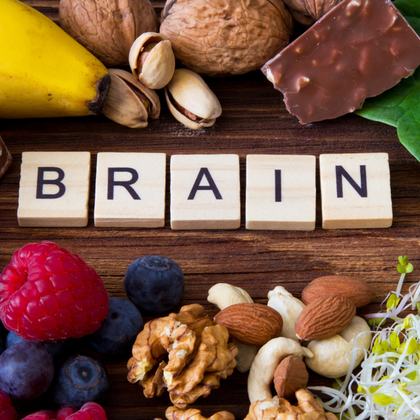
Whatever our age, we’d all like a better memory. And millions of us attempt to achieve just that by regularly practising one or more forms of brain training. This includes using memory and brain training apps, doing crossword puzzles or Suduko, playing chess or taking part in creative pursuits such as painting or learning to play music, or learning new languages.
Brain training is, of course, just one of the ways you may help keep your brain healthy. You could say other things are equally – and arguably even more – important, such as having a healthy lifestyle that includes regular physical activity, getting plenty of sleep, eating a balanced diet, reducing stress and keeping physical conditions that may affect brain health under control (high cholesterol, high blood pressure and other age-related illnesses, for instance).
But how do brain training games work?
The fact that it’s a multimillion-pound industry suggests brain training does have something going for it. However experts are still divided on the issue, with researchers arguing for (i) and against (ii) the idea. The truth is probably rather more complicated. For instance, a large-scale study backed by Cambridge University and the BBC found that while training several times a week using exercises designed to boost reasoning, memory, planning, visuospatial skills and attention resulted in improvements in all of these areas, these improvements didn’t transfer to other cognitive skills (iii).
In other words, brain-training games may make you good at remembering numbers, for instance, but it doesn’t mean you’ll automatically become better at remembering names and faces too.
What is cognitive reserve?
Brain and memory games may, however, help you build up something called your cognitive reserve.
Writing for Age UK, Professor Yaakov Stern, a professor of neuropsychology at Columbia University in New York, describes cognitive reserve as a build-up of thinking abilities you develop during your life that may help protect against some of the brain-related problems that can be caused by ageing and ill health (iv). So if you have a good cognitive reserve, you may be more resilient to the effects of ageing because you have a better ability cope with the changes in the brain that come with getting older than someone with a poor cognitive reserve.
For instance, studies – says Professor Stern – have shown two older people with the same degree of age-related changes in their brain may perform very differently when doing cognitive exercises. Similarly, two people with dementia who have similar levels of cognitive abilities may have very different amounts of changes in the brain that are associated with the disease.
While nobody yet knows exactly how you can increase your cognitive reserve, taking part in brain-stimulating activities may be useful – though scientists have yet to find any strong evidence that suggests specific types of activities help slow down cognitive decline or reduce the risk of dementia.
Memory and brain-training games are, however, a lot of fun. And since they’re unlikely to do you any harm, if you enjoy them, then why not make them part of your daily routine? Try things that challenge your brain rather than sticking to games or exercises you’re already good at. Also try mixing things up by doing a variety of different types of games and tasks that force your brain to work and learn new things.
Most of us are already familiar with games and puzzles that challenge us such as crosswords, Sudoku and chess. But here are some other types of brain-boosting activities you could try:
Test your memory
All you need is a standard deck of cards to play this memory game, which is for two players or for someone playing solo.
-
Shuffle the cards and lay them on an even surface, face down, in rows – you could, for instance, organise the cards into four rows of 13 or six rows of nine if you’re using the jokers.
-
Turn over any two cards from any row or combination of rows. If they are the same colour and number (three of hearts and three of diamonds, for instance, or seven of spades and seven of clubs), pick both cards up and keep them. If not, turn them back over.
-
Next, the other person gets a turn (or you just keep playing if you’re on your own). The idea is to memorise where each card is, so that when it’s your turn you’ll be able to identify and locate a pair.
-
The player with the most cards in their possession at the end of the game is the winner.
For a much easier version of this game, just match colours and not numbers, then progress to numbers but not colours. For a more difficult and longer game, use two decks, laying them out in eight rows of 13 cards or nine rows of 12 if you’re using the jokers, matching both colours and numbers. Another version is to have the cards placed randomly – that is, scattered and not in lines.
Other games that help challenge and develop your memory include the following:
Picture perfect
Choose a picture from a magazine, book or display an image on your computer screen. Stare at it for one minute. Then cover up the picture and write down everything you can remember about it, being as specific as possible. If you’re playing with one or more people, the one who remembers the most things accurately is the winner.
List master
Write down a list of eight unrelated words. Study the words for a minute. Do something else for about 10 minutes, then try jotting down the words on the list and see how many you can remember.
Writing in The Guardian, Dr Gary Small – a professor of psychiatry and ageing at the University of California, Los Angeles – describes how you can use what he calls the story method to remember lists. For instance, instead of just trying to memorise the words during your 60 seconds, try creating a story that links them together and make a visual memory of the story.
The example Dr Small mentions uses the list:
Horse
Clown
Tree
Doctor
Pipe
Guitar
Orange
Chair
To remember some of these words, he says, try visualising a clown with orange hair riding a horse along with a doctor smoking a pipe and playing the guitar.
Quick memory bursts
Don’t have much time? Try giving your memory muscle a mini work-out by reciting the alphabet backwards, your phone number backwards or spelling your name backwards.
Board Games
Board games aren’t just for children. They’re a lot of fun for adults too. And they may help increase your brain function. For example, playing games may help with the following (v):
-
They stimulate the brain areas responsible for memory formation and complex thought processes
-
They help with decision making
-
They help you develop strategic thinking
-
They boost your problem-solving abilities
You could try having a regular games night where you play with a group of friends. Some board games are available online too, where you could play with someone else remotely. Whichever you choose, here are a few you could consider:
Scrabble
Many of us played the word game Scrabble when we were children, but it’s great for adults too, and a good challenge for the brain. It also helps you learn new words and remember words you’ve forgotten about, plus it’s perfect for practising your spelling.
Risk
One for those who have a strong competitive streak, Risk is a group game about world and political domination. By playing, you’ll give your decision-making skills a great work-out (even if you don’t become master of the world).
Clue
Fancy yourself as an amateur sleuth? If you’re a fan of crime fiction, this could be the game for you. Clue makes you the detective and gives your brain a challenge as you try to discover who the murderer is by following a set of clues.
Monopoly
Practice your creative and strategic thinking skills – not to mention your flair for business, finance and budgeting – by gathering a group of players for a game of Monopoly. It may not be an obvious brain training game, but it will help develop your planning and mathematical skills.
Azul
You may not know this game as it’s newer than classics such as Scrabble and Monopoly, but Azul is ideal for practising your strategic and planning skills. It involves the placement of patterned tiles, so it helps develop your visual and spatial cognitive functions too.
Brain training: apps and online games
The biggest growth area for brain training games is the digital market – that is, apps you can use on your smartphone and online training and games. There are far too many to mention here, but the following will give you an idea of what’s available:
Luminosity
This is currently one of the biggest and most well-known brain training mobile apps (available from the App Store and Google Play), but you can use it on your desktop computer too – visit http://luminosity.com/ . According to the company, Luminosity offers science-based games designed to exercise memory, attention, speed, flexibility and problem-solving. It’s free if you’re happy to play just three games a day. If not you can subscribe for access to more games and a personalised brain training programme.
Elevate Brain Training Games
Also free but with in-app purchases, Elevate Brain Training is an app you can download onto your smartphone or tablet via the App Store or Google Play. It aims to improve attention, speaking skills, processing speed, memory, comprehension and other cognitive skills by offering more than 35 brain games. And like many other similar apps it lets you track how you’re progressing.
Peak
Like Elevate, Peak is an app only, offering brain games that help develop brain functions such as focus, memory, problem-solving, mental agility, co-ordination, creativity, emotional control and more. Free with in-app purchases, it features more than 45 games made in partnership with experts from leading universities such as Cambridge and New York Universities. A complete brain training workout takes just 10 minutes a day, and you can stay motivated by seeing how you’re performing compared with others. Download it from the App Store or Google Play
Happy Neuron
This website-based training programme divides its brain training into five areas, namely memory, attention, language, executive functions and visual/spatial. However it’s only free for seven days – after that, you pay a subscription (currently $14.90 a month). It offers personalised training as well as personalised coaching, which takes your particular strengths and weaknesses into account. Find out more at happy-neuron.com
Braingle
If, on the other hand, you prefer something simpler, the Braingle website offers thousands of more conventional brain teasers, riddles, logic problems and mind puzzles – it claims to have the largest collection anywhere on the internet. Be warned though – it can be addictive. Take a closer look at braingle.com
Other ways to keep your brain healthy
Having a healthy lifestyle and practising daily brain games and exercises may help keep your brain active and in good condition. But you may also want to consider taking natural supplements to give your brain that extra bit of support. Here are some you could try – read more about them and the scientific evidence that supports their use for cognition support in our guide to nutrition for the brain
High-strength fish oils
Supplements made from oily fish that contain the omega-3 fatty acids EPA and DHA are thought to be good for your brain, so they may be particularly beneficial if you don’t like eating fish. If you’re a vegetarian or vegan you can now get these important omega-3s in a veggie/vegan-friendly formulation – look for omega-3 supplements that contain algae, which supply fish with omega-3s in the first place.
Turmeric (curcumin)
Curcumin is one of the many active ingredients found in the curry spice turmeric, and may be helpful for cognitive decline. You can add turmeric to your food, or take a turmeric supplement if that’s more convenient. Consider trying a good-quality supplement that provides a high percentage of curcuminoids (curcumin is a type of curcumninoid).
Ginkgo biloba
Nutritional therapists often use the herb ginkgo biloba to treat memory problems and cognitive function in older people.
B complex
Some of the B vitamins – including vitamin B6, B12 and folate (or folic acid) – may help slow down cognitive decline. B vitamins are widely available in our diet, but many people may not get enough of them. You can take individual B vitamin supplements, but it’s often considered more convenient to take a B complex supplement or a multivitamin formula with good levels of the Bs.
Astaxanthin
Antioxidants may be helpful in supporting cognitive health, especially if your levels are already less than decent. A particularly potent antioxidant found in a type of freshwater algae, astaxanthin can be found in supplement form as well as in foods such as salmon, lobster, crawfish, rainbow trout and crab. As a supplement it is usually suitable for vegetarians and vegans (check the label – some capsules can contain non-vegetarian and non-vegan ingredients).
Iodine
If you’re deficient in this essential mineral it can lead to an underactive thyroid, which can affect your cognition. You can get iodine in fish, eggs and other dairy products, as well as in nutritional supplements such as multivitamins.
Rosemary
Both the scent and compounds found in rosemary may be beneficial for memory problems. Add some of this fragrant herb to your food, or look for a nutritional supplement that contains it. You can also release the smell of rosemary essential oil in a heat-based diffuser.
Iron
This essential nutrient helps with blood flow, including blood flow to the brain, and is thought to help with cognitive health especially in those who are deficient in it. If you don’t eat a lot of iron-rich foods – such as red meat, liver, beans and nuts – you can get it in a single supplement or as part of a multivitamin formulation.
Zinc
This essential nutrient is found in high levels in the brain. You can get it in foods such as meat, nuts and dairy products, or if you don’t get much in your diet try a zinc supplement or multivitamin that has good zinc levels.
Phosphatidyl serine
Found in foods such as egg yolks, soya beans, fish and meat, phosphatidyl serine is often sold as a brain health supplement, as some experts think it may help boost memory and cognition.
Ashwagandha
One of the most widely used herbs in Indian Ayurvedic medicine, ashwagandha contains compounds called withanolides that some think are good for the brain. It’s widely available as a supplement, though not all brands contain beneficial levels of withanolides (look for a product that contains at least 1.5 per cent withanolides).
Vitamin C
Like the B vitamins, vitamin C is widely found in foods – yet some people may not be getting enough of it in their diets. Some scientists even believe it may help with cognitive functioning. You can get vitamin C supplements in many forms, including tablets, capsules and powder.
Magnesium
Found in foods such as dark chocolate, nuts, seeds, legumes, milk, oily fish, red meat and leafy green vegetables, magnesium may be beneficial if you want to give your brain a boost. However, despite the fact that it’s in many different foods, some people may have low levels of magnesium. If you want to try a supplement, look for magnesium in a more absorbable form, such as magnesium citrate.
Green tea
If you like drinking green tea, your brain may already be getting a supply of certain helpful compounds. If you’re not a fan of the taste, however, you can try a green tea supplement – choose a product with a good level of active antioxidant ingredients called polyphenols.
For lots more advice and information on a wide range of physical, mental and cognitive health and wellbeing issues, take a tour around our health library.
References:
-
Au J. et al., There is no convincing evidence that working memory training is NOT effective: A reply to Melby-Lervåg and Hulme. Psychonomic Bulletin & Review. 2015;23:331–337(2016). Available online: https://link.springer.com/article/10.3758/s13423-015-0967-4
-
Stanford Center on Longevity. A Consensus on the Brain Training Industry from the Scientific Community (Full Statement) October 2014. Available online: https://longevity.stanford.edu/a-consensus-on-the-brain-training-industry-from-the-scientific-community-2/
-
Owen AM. et al., Putting brain training to the test. Nature. 2010 Jun 10;465(7299):775-778. Available online: https://www.ncbi.nlm.nih.gov/pmc/articles/PMC2884087/
-
Available online: https://www.ageuk.org.uk/information-advice/health-wellbeing/mind-body/staying-sharp/thinking-skills-change-with-age/cognitive-reserve/
-
Available online: https://www.ageuk.org.uk/information-advice/health-wellbeing/mind-body/staying-sharp/thinking-skills-change-with-age/cognitive-reserve/
Related Posts
Disclaimer: The information presented by Nature's Best is for informational purposes only. It is based on scientific studies (human, animal, or in vitro), clinical experience, or traditional usage as cited in each article. The results reported may not necessarily occur in all individuals. Self-treatment is not recommended for life-threatening conditions that require medical treatment under a doctor's care. For many of the conditions discussed, treatment with prescription or over the counter medication is also available. Consult your doctor, practitioner, and/or pharmacist for any health problem and before using any supplements or before making any changes in prescribed medications.

Christine
Christine Morgan has been a freelance health and wellbeing journalist for almost 20 years, having written for numerous publications including the Daily Mirror, S Magazine, Top Sante, Healthy, Woman & Home, Zest, Allergy, Healthy Times and Pregnancy & Birth; she has also edited several titles such as Women’ Health, Shine’s Real Health & Beauty and All About Health.
View More



